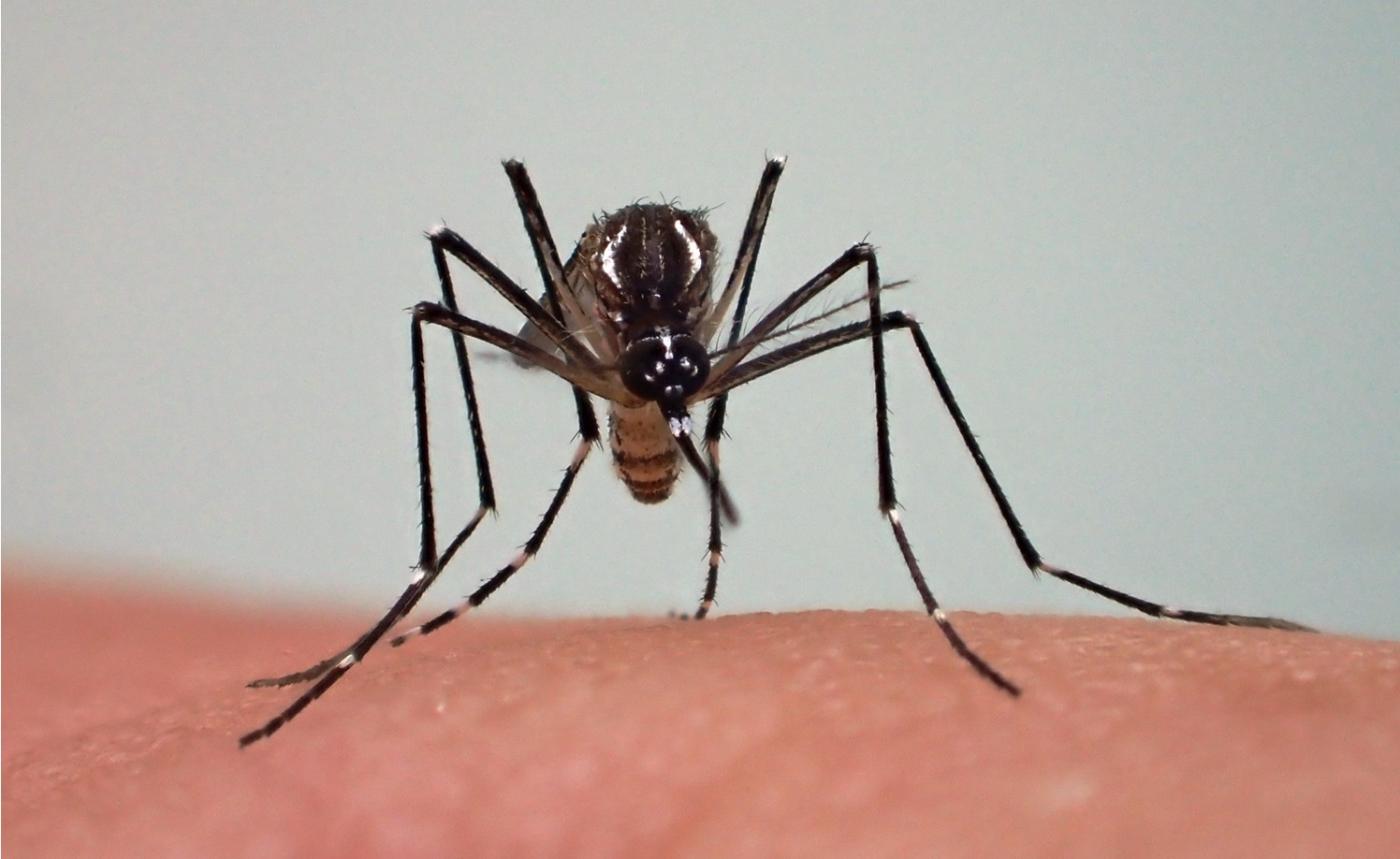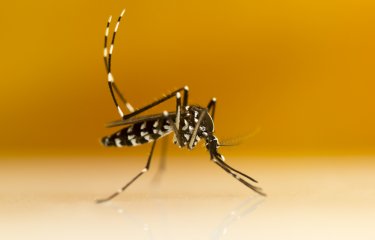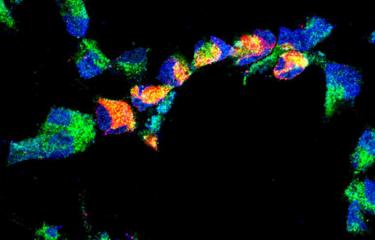What are the causes?
Zika virus disease, also known as Zika fever, is caused by an arbovirus belonging to the Flavivirus genus of the Flaviviridae family, like the dengue and yellow fever viruses. The insect vector of the disease, the female Aedes mosquito, can be recognized by the black and white markings on its legs.
How does the virus spread?
The Zika virus is transmitted by the bite of mosquitoes of the genus Aedes. These mosquitoes are mainly active during the day.
A mosquito becomes infected with the virus when it bites a person carrying Zika during a blood meal. The virus replicates in the mosquito without affecting the insect. When the mosquito bites someone else, it releases the virus into their bloodstream. Symptoms appear 3 to 12 days after the bite, but during this time the person can infect other mosquitoes if bitten again. This is why people suffering from Zika must avoid getting bitten to break the viral transmission cycle.
Zika virus can also be transmitted through sexual contact, blood transfusion and organ transplantation.
Pregnant women can also pass on the virus to their unborn children and this can lead to serious fetal brain development defects.
What are the symptoms?
Most people infected with Zika virus (probably 70 to 80% of cases) do not develop any symptoms. If symptoms do occur, they develop 3 to 4 days after the mosquito bite. They resemble the symptoms of dengue or chikungunya, also transmitted by the same mosquito: fever, headache, fatigue, and muscle and joint pain. Various types of skin rash may also occur. Some patients also present with conjunctivitis, pain behind the eyes, digestive problems or swelling of the hands or feet. In most cases, the symptoms are mild and do not require hospital treatment.
In some cases, infection can cause severe neurological and autoimmune complications, especially Guillain-Barré syndrome and congenital abnormalities in newborn infants, such as microcephaly (an abnormally small head).
How is infection diagnosed?
Zika virus infection is diagnosed by blood or urine tests to detect the presence of the virus (RT-PCR) or specific antibodies (serological testing). These tests are particularly important for pregnant women living in regions where the virus is present or with partners who have traveled to these regions.
As the symptoms are non-specific and the Zika virus is found in the same regions as the dengue and chikungunya viruses, it is difficult to make an accurate diagnosis.
What treatments are available?
There is currently no vaccine to prevent Zika virus infection and no specific medication to treat the disease.
Treatment involves taking pain killers to relieve the symptoms. But non-steroidal anti-inflammatory drugs should be avoided until dengue virus infection has been ruled out, because in the event of dengue the anticoagulant effect of the drug could cause bleeding.
How can Zika virus infection be prevented?
The only means of protection against Zika virus infection is to avoid mosquito bites during the day and night, especially in the morning and evening, when mosquitoes are most active, using a combination of basic protective measures and chemical products:
- Regularly apply repellents approved by health authorities.
- Wear clothes that cover the arms and legs, especially during the day.
- Use mosquito nets at windows and around rest areas.
As well as these personal protection measures, disease prevention also involves controlling mosquito proliferation. Any potential mosquito breeding sites, for example stagnant water in flower pots, gutters and old tires, must be removed. Any water containers located around the home should be emptied after each spell of rain.
How many people are affected?
From the first identification of the Zika virus in Uganda in 1947 to the global epidemic in 2015-2016, the virus has affected millions of people worldwide.
In 2013 and 2014, 55,000 cases of Zika were reported in French Polynesia. The outbreak then spread to other islands in the Pacific, especially New Caledonia, the Cook Islands and Easter Island.
The virus has been present in Colombia, El Salvador, Guatemala, Mexico, Panama, Paraguay, Suriname, Venezuela and Honduras since October 2015.
As of April 7, 2016, Martinique had 16,650 presumed cases (awaiting laboratory confirmation). French Guiana had 3,620 cases and Guadeloupe 1,090 cases.
According to WHO, as of late 2021, 89 countries had reported indigenous Zika cases.
See the WHO epidemiology update on Zika virus infection (February 2022)
Further information can be found on the following websites:
- World Health Organization (WHO): Page on Zika virus

“The Geopolitics of the Mosquito” - Go further with our experts!
VIDEO - Virus Zika, pourquoi aujourd'hui ?
Arnaud Fontanet, responsable de l’unité d’épidémiologie des maladies émergentes, co-directeur de l’école Pasteur/CNAM de Santé publique
Arnaud Fontanet nous explique dans cette vidéo les résultats obtenus avec ses collègues de Polynésie française lors de l’épidémie de Zika de 2013-2014 : les scientifiques ont établi le lien de causalité entre le virus et certains cas graves avec syndromes de Guillain-Barré d'une part, et d’autre part des cas de microcéphalie chez des enfants nés de femmes ayant été infectées au cours de leur grossesse.
VIDEO - Zika Summit 2016
Zika virus poses many questions and concerns for humanity. Scientists and experts are racing to understand the relationship between Zika virus infection and associated neurological complications such a microcephaly and Guillain-Barré syndrome.
The Institut Pasteur, WHO and other partners convened reserachers and public health experts working on this ongooing public health emergency to share preliminary results and discuss next steps.
September 2024





